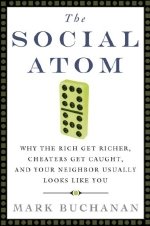The advantage of science over ideology is that science (when it's done well) aims to learn and accept the facts, however uncomfortable they may be. You may want the universe to be infinite, or finite, finite with sharp edges or finite but unbounded (like the surface of a sphere), or something else entirely different, but ultimately your desires won't change anything. Really good scientists have the ability to question their own preconceptions, and adjust their beliefs in the light of new facts. As Nietzsche once said, it's not so hard to have the courage of one's convictions; much more difficult is to have the courage to question one's own convictions.
I noticed today that the NYT's David Brooks cited a recent paper from MIT economists Xavier Gabaix and Augustin Landier on the matter of CEO pay in the U.S. However much I find Brooks' views frequently irritating, and while I strongly suspect he cites this work because it supports his natural affinity for hard-boiled capitalism, this particular citation does seems wholly appropriate -- for Gabaix's work, at least what I know of it, is based strongly on careful science.
What the paper claims is that the six-fold rise in CEO pay over the past two decades cannot easily be attributed to a culture of runaway greed or any other insidious evolution of corporate management. Rather, it seems that relatively straightforward economic factors -- essentially the competition between firms for good decision makers -- may well explain the rise. Over the same two decades, the authors point out, the size (capitalization) of the largest U.S. firms has also gone up by a factor of six. CEO's make so much more now, the argument goes, not because of stock options, or managerial "skimming" of corporate profits, but because their actions influence enormously larger sums of money -- and small but real differences in their abilities count for a lot.
This is very much traditional "neoclassical" economics, but their argument, in more detail, seems strongly plausible. They assume that firms compete for CEO talent, and that talent naturally becomes increasingly important in larger firms with more assets at stake. Mathematically, this leads to the prediction that larger firms should have more highly paid executives, which is empirically true. (CEO pay rises in a regular way as firm size (capitalization, earnings, number of employees) raised to the 1/3rd power.) It also predicts that CEO pay on average across the largest firms should rise in direct proportion to the average size of those firms -- not actually a startling conclusion, when you begin thinking this way.
But there's one other interesting thing in this work. Gabaix and Landier use their theory, and the data on compensation, to make an estimate on the distribution of talent among CEOs. What they find is that over the top CEOs, say the top 1,000, the variation in talent is almost zero. Taking the very best CEO and replacing him or her with the 1,000th best, would tend to decrease a firm's earnings by only 0.04% -- less than one part in 1,000. BUT -- because the largest firms are so large, and have so many assets, this tiny change can have major monetary consequences. So it makes sense, from a strictly economic point of view, for CEO number 1 to make a lot more than CEO number 1,000 even though their skills are essentially equal.
Of course, none of this says anything about the kinds of effects that gross economic inequality, stirred up by such enormous pay differences, may have on the larger community. That's another story. But what is clearly so nice about this work, at least in my opinion, is that it offers such a natural and non-conspiratorial explanation by making a direct appeal to real data. We could do with more of that.
Monday, July 23, 2007
Irritating details
Subscribe to:
Post Comments (Atom)




9 comments:
"none of this says anything about the kinds of effects that gross economic inequality, stirred up by such enormous pay differences, may have on the larger community. That's another story". ah, but this is the story I'd really like to see some exposure and get told over and over...do you think this will happen?
Hi Kimy,
I hope it does happen! And I think alot of economists and social scientists, at least, I'm not sure about business types, are taking this a lot more seriously. For example, there's been considerable experimental work on human happiness (or, at least, personal perceptions of it) which shows that people tend to judge their well being not in absolute terms, but relative to others. It's part of our make-up, and very hard to avoid, that we compare ourselves to others. So even if everyone has more stuff, high inequality can end up making most people feel worse off!
More often than not Brooks' views and writings are irritating--even infuriating.
Take these two quotes from his recent article on globalization and CEO compensation:
"This story is not entirely wrong, but it is incredibly simple-minded. To believe it, you have to suppress a whole string of complicating facts."
Also, regardless of which side of the debate wins out, "the facts matter."
The same is true regarding our misguided and mismanaged war in Iraq. The war was initiated on false pretenses, ignorance and arrogance have guided our actions since, we've let the anarchy genie out of the bottle, countless lives and money have been wasted and yet Brooks can blithely state that Bush is a "smart and compelling presence in person."
Occasionaly Brooks acts like he believes in the scientific method and the power of argument and evidence when it suits him. But most of the time he comes off like a Republican Party hack and let the facts be damned.
Mark,
A .04% earnings differential spread among a thousand CEOs seems like an awfully small effect to attribute unambiguously to CEO performance. Did Gabaix and Landier arrive at this number by doing a thorough statistical analysis that throws out everything other than what's clearly attributable to CEO performance?
Partha,
I agree completely! In fact, I sent an email earlier today to the researchers asking pretty much just your question. How can management possibly perceive such small differences? I'll post more when I hear back.
Mark
Mark,
Robyn Meredith, author of "The Elephant and the Dragon," argues that the addition of a billion strong workforce to the world economy in a short period is going to have a strong, disruptive impact on job availability in the West. The issue of the disparity between CEO and worker pay needs a deeper and more objective analysis than Brooks' usual facile screed.
I/O psychologists have considered the question of performance for a very, very long time. One unambiguous finding is that IQ, the unpopular type measured by IQ tests, is the single most important predictor of performance in complex jobs-it accounts for ~25% of differences in job performance. IQ measures how quickly someone learns, how much someone learns, the breadth of associations and perspective that one forms (one's meta-knowledge) and his or her quickness at coming up with solutions to novel problems. Personality--whether one is ethical, sets and achieves goals, reliable, emotionally adjusted, gets along with people, optimistic--accounts for another 10% (iirc). The rest of performance is accounted for by seasoning, ethics, judgment, years of experience and measurement error.
The bottom line is that one cannot reliably predict who is number 1 and who is number 1000.
Conservatives love the Heroic Executive model, the idea that some brilliant man (or woman) will make all the difference. And while it is true, in some cases, that individuals make a huge difference, and some individuals are exceptional, I suspect that, as a general rule, the best companies are characterised by talent, excellent operating systems and good communication throughout. A competent CEO succeeds because he or she has a lot of help.
Thus, the notion that talented CEOs "are worth" obscene levels of compensation is just magical thinking. Boards focus on the CEO because humans are notoriously bad at attributing behavior to situations.
Kate,
Very interesting comment. I recall reading some study recently -- sadly I can't recall where -- to the effect that in addition to IQ, hard work and general activity level is also an important predictor of success. It reminded me of Einstein's saying that success is "10% inspiration, and 90% perspiration".
Anyway, I think you're probably right:
"Thus, the notion that talented CEOs "are worth" obscene levels of compensation is just magical thinking. Boards focus on the CEO because humans are notoriously bad at attributing behavior to situations."
We do have a natural longing to attribute success or failure of an enterprise to some person.
I'll be interested in what the researchers say about whether or not firms really can identify "the best" CEOs by any means (other than reference to their past records). I think the argument is quite instructive -- and probably has quite a lot to do with the truth -- but I'm not sure it deals adequately with the "noise" of the real world which makes identifying talented individuals very hard indeed.
Yes, you're right, hard work and activity level are also important predictors of performance, but they cannot substitute for mental ability. Just as it doesn't matter how smart you are if you don't apply yourself, it also doesn't matter how hard you work if you lack the mental ability to keep up.
Range restriction is involved--in this case, if you have a group of 1000 CEOS, all of whom have IQs in the top 5% of the population, then you will find that the number of hours they log correlates with their performance better than ability. The ones who can get by on four hours of sleep a night and who are willing to work 80 hours a week will be more productive.
One interesting finding--and now I can't remember the source, sigh--suggests that CEOs rarely repeat their successes. There are some notable exceptions, but the exceptions don't change the rule. I interpret that finding as evidence that situational factors affect performance more than we recognize.
I am convinced by the arguments made by these economists that CEO compensation is a function of growth in the size of organizations. And it is a well-known phenomena that miniscule differences in performance have a big impact on the bottom line. However, I know of no way to predict which individual will be "the best" except after the fact. Measurement error prevents that kind of precision.
Perhaps, social comparison also plays a role in the behavior of boards. They compete with each other, and since actual prediction is impossible but the stakes are high, a Board choses to pay their CEO top dollar because that way they can reassure themselves, through the fallacy of affirming the consequent, that they have hired the best person out of that pool of 1000.
Post a Comment